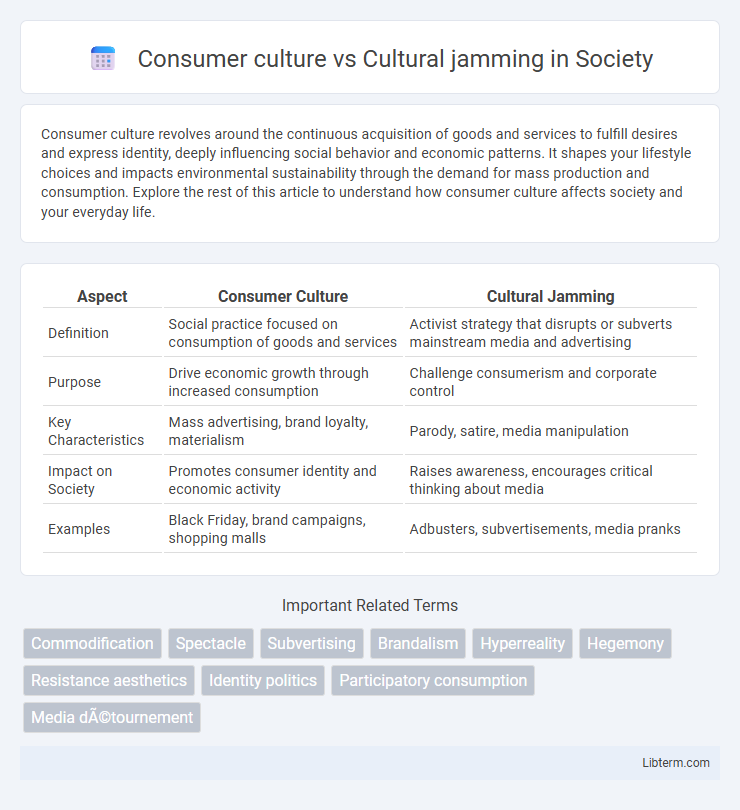Consumer culture revolves around the continuous acquisition of goods and services to fulfill desires and express identity, deeply influencing social behavior and economic patterns. It shapes your lifestyle choices and impacts environmental sustainability through the demand for mass production and consumption. Explore the rest of this article to understand how consumer culture affects society and your everyday life.
Table of Comparison
| Aspect | Consumer Culture | Cultural Jamming |
|---|---|---|
| Definition | Social practice focused on consumption of goods and services | Activist strategy that disrupts or subverts mainstream media and advertising |
| Purpose | Drive economic growth through increased consumption | Challenge consumerism and corporate control |
| Key Characteristics | Mass advertising, brand loyalty, materialism | Parody, satire, media manipulation |
| Impact on Society | Promotes consumer identity and economic activity | Raises awareness, encourages critical thinking about media |
| Examples | Black Friday, brand campaigns, shopping malls | Adbusters, subvertisements, media pranks |
Understanding Consumer Culture: Definition and Origins
Consumer culture, defined by the saturation of market-driven values and consumption patterns, originates from the industrial revolution and the rise of mass production and advertising. It emphasizes identity and social status through material possessions, shaping behaviors and societal norms. Cultural jamming challenges these consumerist ideals by subverting corporate messaging to expose and critique the pervasive influence of consumer culture on public consciousness.
The Rise and Influence of Mass Consumerism
Mass consumerism, characterized by the rapid expansion of advertising and mass media, shapes consumer culture by promoting materialism and brand loyalty. Consumer culture emphasizes constant consumption and identity formation through products, while cultural jamming actively disrupts this narrative by subverting advertisements and exposing corporate manipulation. The rise of mass consumerism fuels a cycle of consumption that cultural jamming seeks to critique by encouraging critical awareness and resistance to mainstream marketing strategies.
Key Characteristics of Consumer Culture
Consumer culture is characterized by mass consumption, where individuals acquire goods and services to express identity and social status. It emphasizes brand loyalty, materialism, and the influence of advertising in shaping desires and behaviors. Cultural jamming challenges these norms by disrupting mainstream media messages and promoting critical awareness of consumerism's impact on society.
What is Culture Jamming? An Introduction
Culture jamming is a form of subversive activism that disrupts and critiques consumer culture by altering or parodying mainstream media messages and advertising. It aims to expose the manipulative tactics of corporations and challenge the dominance of consumerism in society through creative interventions such as billboard modifications, viral campaigns, and guerrilla art. By highlighting consumerism's impact on identity and social values, culture jamming fosters critical awareness and resistance against corporate control in everyday life.
Techniques and Methods Used in Culture Jamming
Culture jamming employs techniques such as subvertising, guerrilla art, and detournement to disrupt mainstream consumer culture and challenge corporate messaging. Methods include altering advertisements to expose hidden motives, creating parody media that critiques consumerism, and staging public interventions to provoke critical thinking about brand dominance. These strategies leverage irony, humor, and visual manipulation to undermine the persuasive power of consumer culture and promote social awareness.
The Role of Media in Shaping Consumer Culture
Media plays a pivotal role in shaping consumer culture by promoting brand loyalty and influencing purchasing behaviors through targeted advertising and storytelling techniques. Consumer culture thrives on media's ability to create desires and social norms that equate personal identity with material possessions. Cultural jamming counters this by subverting media messages, exposing consumerism's manipulative tactics and encouraging critical awareness among audiences.
Consumer Culture vs Cultural Jamming: Core Differences
Consumer culture emphasizes mass consumption and brand loyalty driven by advertising, shaping identity through material possessions. Cultural jamming disrupts these marketing messages by subverting brand imagery and slogans to challenge consumerism and corporate power. The core difference lies in consumer culture promoting conformity to market norms, while cultural jamming encourages critical thinking and resistance against mainstream commercial influences.
Impact of Cultural Jamming on Social Awareness
Cultural jamming disrupts consumer culture by subverting mainstream advertising messages, exposing underlying corporate motives and encouraging critical thinking. This form of activism raises social awareness by challenging passive consumption and prompting audiences to question societal norms related to materialism. Through impactful visuals and satire, cultural jamming fosters greater public engagement with issues like environmental sustainability, social justice, and media literacy.
Case Studies: Successful Cultural Jamming Campaigns
Successful cultural jamming campaigns such as Adbusters' "Buy Nothing Day" and Barbie Liberation Organization's voice swap stunt have effectively challenged consumer culture by subverting mainstream advertising messages. These case studies highlight how guerrilla marketing techniques disrupt brand narratives, encouraging critical reflection on materialism and corporate control. By leveraging shock value and satire, cultural jamming transforms consumer engagement into activism against overconsumption.
Future Trends: Redefining Resistance Through Culture Jamming
Future trends in consumer culture and cultural jamming reveal a growing shift toward digital activism, where social media platforms serve as battlegrounds for contesting corporate narratives. Cultural jamming evolves through augmented reality and AI-driven interventions, enabling activists to subvert advertising and brand messages with immersive, interactive experiences. This redefinition of resistance harnesses technology to disrupt consumerism and promote critical awareness, fostering a more engaged and conscious audience.
Consumer culture Infographic

 libterm.com
libterm.com